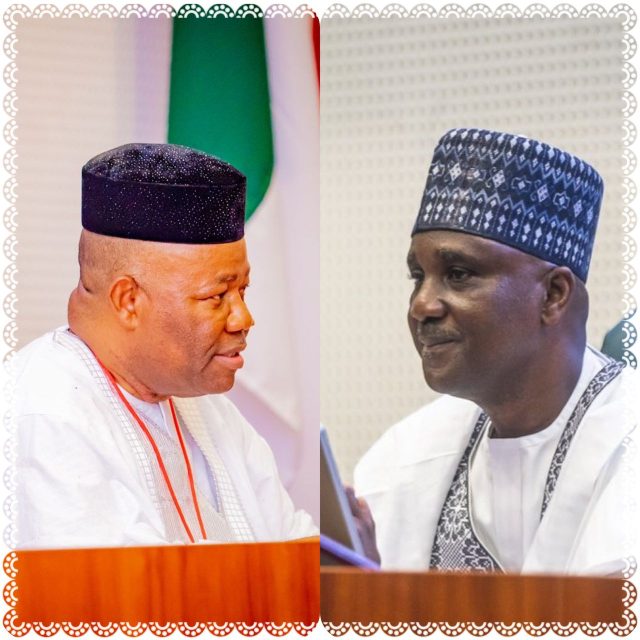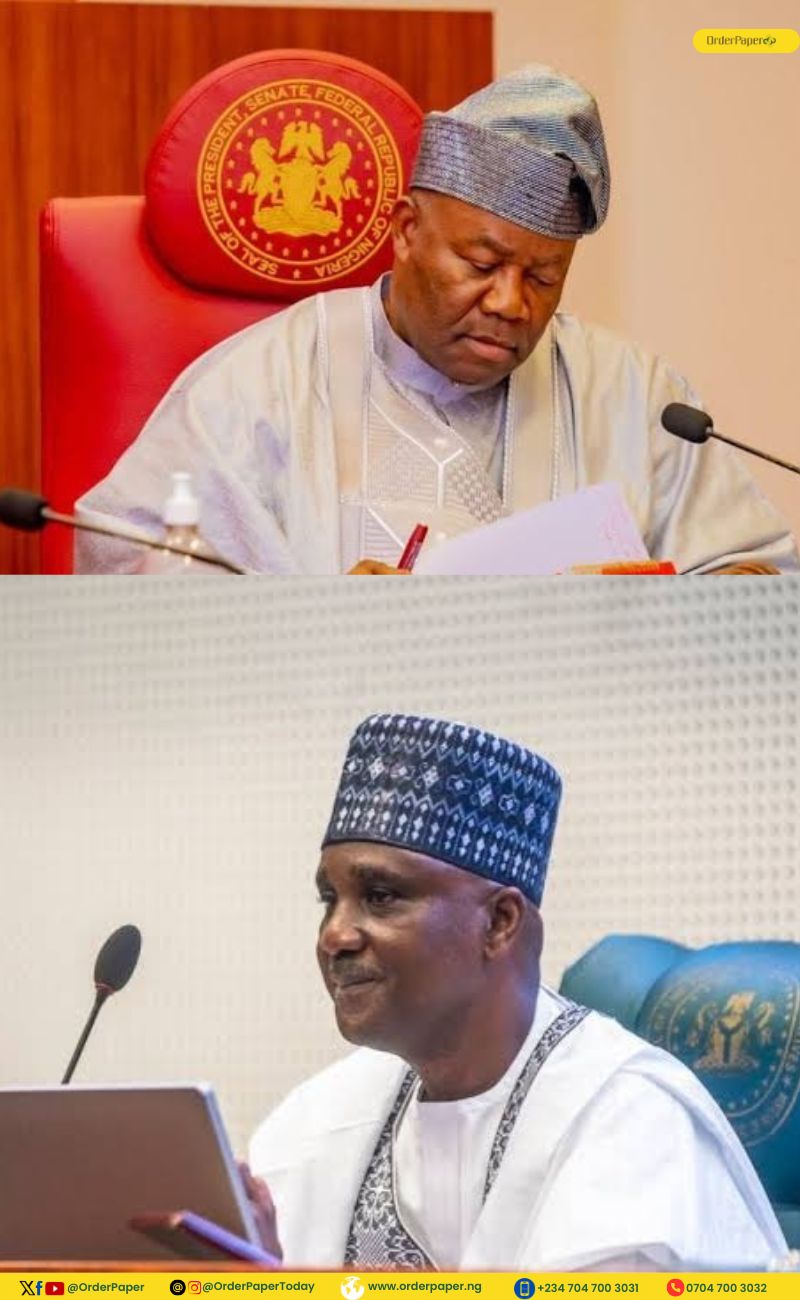By Elizabeth Atime and Temidayo Taiwo-Sidiq
As the National Assembly resumes from its two-week break, OrderPaper, Nigeria’s foremost independent parliamentary monitoring organisation and policy think tank analyses key issues that should top the agenda of lawmakers in both chambers of the federal parliament.

With the elections for Presiding Officers now off the way, the Tenth National Assembly will resume from a two-week break to fully settle for legislative business this week.
It is common news that Senator Godswill Akpabio (APC, Akwa Ibom) and Rep. Tajudeen Abbas (APC, Kaduna) were elected as President of the Senate and Speaker of the House of Representatives, respectively, while Senator Jibrin Barau (APC, Kano) and Rep. Benjamin Kalu (APC, Abia) emerged as the Deputy President of the Senate and the Deputy Speaker House of Representatives respectively.
The next political battle will, however, be shifting to the race for the eight Principal Officers positions in the Senate and House viz: Majority Leader, Chief Whip, Minority Leader, Minority Whip, Deputy Majority Leader, Deputy Chief Whip, Deputy Minority Leader and the Deputy Minority Whip. Similarly, the jostling, lobbying and politicking are still on for the Chairmanship of the various Standing Committee positions in both chambers of the National Assembly.
For efficient service delivery to the Nigerian people, attention will be on the Assembly to take every pillar of their core mandate; lawmaking, oversight and representation very seriously.
Why are the Committees important?
At the heart of the core function of oversight are the Standing Committees in both chambers of the National Assembly; which is an area the Presiding Officers must be circumspect in their selection and get the composition right.
It is given (in line with convention) that the loyalists and major campaigners for the current Senate President and Speaker of the House are likely to dominate the most strategic committees in both chambers of the National Assembly. However, the expectations of Nigerians will be the need to prioritise capacity and legislative experience in the composition of the Committees.
With fears still high in the air about the possibility of the Tenth Assembly been perpetually in bed with the executive, the area of oversight will be a huge opportunity for the lawmakers to distinguish themselves in performing the onerous task of checks and balance on the executive. According to Senator Akpabio, the Tenth Assembly is going to be nothing short of a corrective parliament; Nigerians will be looking up to a federal parliament under his Chairmanship that will erase the era of uncountable summons and threats of arrest on key officials of the Ministries, Departments and Agencies of government.
In this light, the country’s debt profile issue must be taken seriously as Nigeria continues to pay heavy sums to service its domestic and external debts. Nonetheless, the federal government plans to borrow N10.78 trillion to finance the N21.83 trillion 2023 budget deficit. A breakdown of the figure shows that the government would be spending at least N4,495,111,346,991 trillion on domestic debt (including Ways and Means). It would also be spending N1,814,759,620,336 trillion to service foreign debt in 2023.
The Economist Intelligence Unit had in July 2022 declared Nigeria’s revenue-to-debt service ratio as “the worst in the world” (January to April 2022), when up to 92 per cent of all revenue went into servicing debt. It is predicted to reach 116 per cent before the end of 2023 and 160 per cent by 2027. The situation is further worsened by the inability of the National Assembly to turn down loan requests by the Executive, as it usually brushes aside all calls for caution on domestic and foreign loans. It is expected that the 10th Assembly will do due diligence on all loan requests and turn them down if need be.
Furthermore, data from the Debt Management Office (DMO) indicates that the government’s domestic debt stock was N19.24 trillion as of December 2021. By September 2022, it had risen to N21.55 trillion. The National Assembly also approved another N819.54 billion loan as a Supplementary Budget for the immediate past President Muhammadu Buhari before his exit, putting Nigeria’s domestic debt profile at N22.57tn.
Borrowing to supplement other revenue sources, provide infrastructure, social services, and budget support are global best practices among countries across the world, but it is done wisely. Therefore, Nigerians are worried about the unending borrowing and would like the National Assembly to turn down some of these loan requests to save the country from perpetual reliance on loans for funding capital projects.
Lawmaking
Perspectives on the success of the 2023 General Election are as diverse as anyone can imagine, but the polls revealed that a good proportion of the political class and their agents have not totally given up on the need to embrace free and fair elections as a norm in Africa’s largest democracy.
This is further reflected in the various cases in the tribunals against winners of elections up to the Presidency across the federation. The import of this is that there is a greater need to sanitise the electoral system and make the punishment of electoral offenders a deterrent to others who may want to tow that path of impunity in future.
In the area of lawmaking, expectations are rife that the unbundling of the Independent National Electoral Commission (INEC) would come to fruition in the life of this Assembly beginning from the passage of the Electoral Offences Bill.
The 9th House of Representatives had resolved to consolidate about four pieces of legislation titled: ‘Bill for an Act to establish a National Electoral Offences Commission and the Electoral Offences Tribunal. Jointly sponsored by the then Chairman, House Committee on Electoral Matters, Hon. Aishatu Dukku; Hon. Francis Charles Uduyok, Hon. Kingsley Chinda and Hon. John Dyegh, the bill was aimed at providing a legal framework for the investigation and prosecution of Electoral Offences for the general improvement of the electoral process in Nigeria; and for related matters. If this would be a reality under the current Assembly, work will have to commence immediately.
For an Assembly with fewer female Senators and Members of the House of Representatives altogether, in comparison with previous Assemblies, Nigerian women would be resting their hopes on the lawmakers to resurrect the failed gender bills which failed in the Ninth National Assembly. This is especially for constitutional amendment bills that seek to promote and enhance the political participation of women in politics.
Amongst the proposed laws was the bill to create additional seats for women; a bill to enable Nigerian women to transfer citizenship to their foreign husbands; a bill to ensure 35 per cent affirmative action for women; a bill to ensure that a minimum of 20 per cent of ministerial or commissioner nominees are women; and bill to allow a woman to become an indigene of her husband’s state after five years of marriage all failed to pass.
About three weeks ago, Speaker of the House of Representatives, Tajuddeen Abbas, during a ‘Thank You Visit’ to the First Lady Oluremi Tinubu at the Aso Villa, had pledged to ensure inclusive governance and opportunities for women in discharging his duties as Presiding Officer of the Green Chamber.
According to him, the 10th House would ensure that gender-based bills passed by the 9th Assembly but not signed would be re-considered and passed in the 10th House.
”We have emerged in an unprecedented manner; 353 out of 359 voted for me. It has never happened in our history; our leadership is a leadership for all Nigerians. This is your leadership; we will collaborate and partner, particularly in one area that you requested, which is to carry women along,” he assured.
As insecurity persists in various aspects of the country, Nigerians will look up to the federal parliament to usher in the much-talked-about decentralisation in the security architecture with crucial constitutional amendments that will usher in State Police. These are only a few of the numerous expectations in this light.
Representation
Firstly, the lawmakers must be fully involved in the provision of palliatives to cushion the effect of fuel subsidy removal by the federal government. As representatives of the people, they must show interest in what needs to be done to support the people to cushion the huge effects as a result of the removal. Although the government is yet to come up with a concrete plan, pressure, especially from the people’s representatives, must be mounted on the government to ensure that the plight of Nigerians is properly catered to.
This must also include support for the Small and Medium-sized Enterprises (SMEs) who are facing difficulties accessing affordable power and the civil servants who are also agitating for salary increments.
Importantly, efforts must be made to strengthen the plethora of federal institutions set up by the Ninth Assembly in the area of education and health. In doing so, lawmakers must be further discouraged from increasing the cost of governance through the traditional establishment bills which has become another form of constituency project, given the country’s dwindling revenues.
National Assembly Matters
On their own internal matters, the expectations of Nigerians will be expecting greater improvement in the areas of transparency, civic participation and public accountability.
According to the recently launched Open Parliament Index (OPI), 2022, carried out by PNAfrica and Partners, “the Nigerian Parliament was rated fourth among the thirteen (13) Parliaments in West Africa that were assessed. The OPI assessed Parliaments across the sub-region using the three criteria of Open Parliament: Transparency, Civic Participation and Public Accountability, considering the standards of the Open Government Partnership (OGP), the Principles of Parliamentary Openness and the Inter-Parliamentary Union’s (IPU) Indicators for Democratic Parliaments.
The Index was aimed at enabling civil society to work together with national parliaments to identify challenges that hinder the successful achievement of parliamentary openness and to co-create open parliament reforms to strengthen the parliaments’ capacity to improve their openness. The Nigerian Parliament scored: transparency (20.90), civic participation (18.08) and public accountability (10.23), which clearly shows that some gulf and disconnect still exists between the National Assembly and citizens.
READ ALSO: POPULA: “Time for African parliaments to be more transparent”
The National Assembly would do great if it works with Parliamentary Monitoring Organisations (PMOs) who by virtue of their workings and citizen’s perception of their functioning, can be the synergistic catalyst that can promote the strengthening of citizen voices in interfacing with parliament towards engendering improved transparency and accountability. In the same vein, Parliament can find in PMOs genuine partners to harness critical inputs that will enable them to perform more effectively in responding to the yearnings of citizens.
Finally, the renovation of the Main Chambers of the National Assembly is still undergoing renovation, resulting in the use of hearing rooms by the lawmakers as makeshift chambers for plenary.
The House, especially, currently uses two hearing rooms for this purpose due to its membership strength. There is a pressing need for the contractors to hasten up work so that the two chambers can be ready for use. Otherwise, it will encourage a low turnout of lawmakers paid by taxpayers for plenary sessions.
According to the constitution, the quorum for both chambers is one-third of the lawmakers. This should be a top priority for the Tenth National Assembly to look into so as not to discourage members from discharging their responsibilities.
The leadership must also avoid unnecessary or extended recesses as was seen in previous Assemblies, where the Senate in 2021 did not only break its own rules but repeatedly undermined the constitution, which requires it to “sit for a period of not less than 181 days in a year.”
While OrderPaper may not have exhausted all the issues expected to be tackled by the current National Assembly in this report, it will continue to give updates on these issues, and others embarked upon by previous assemblies but unfinished.


